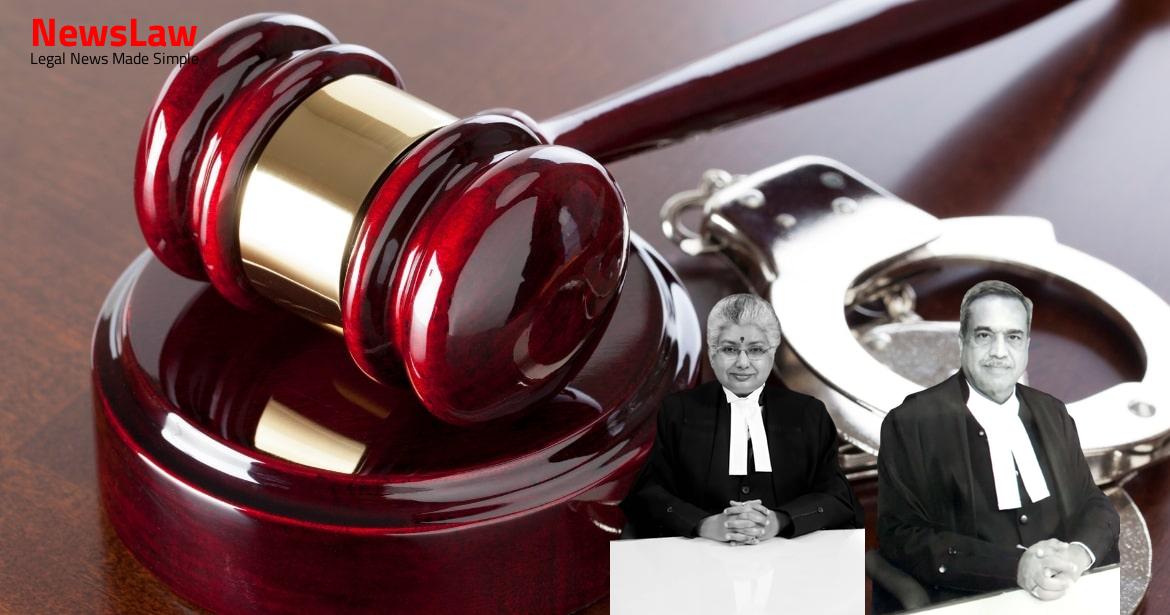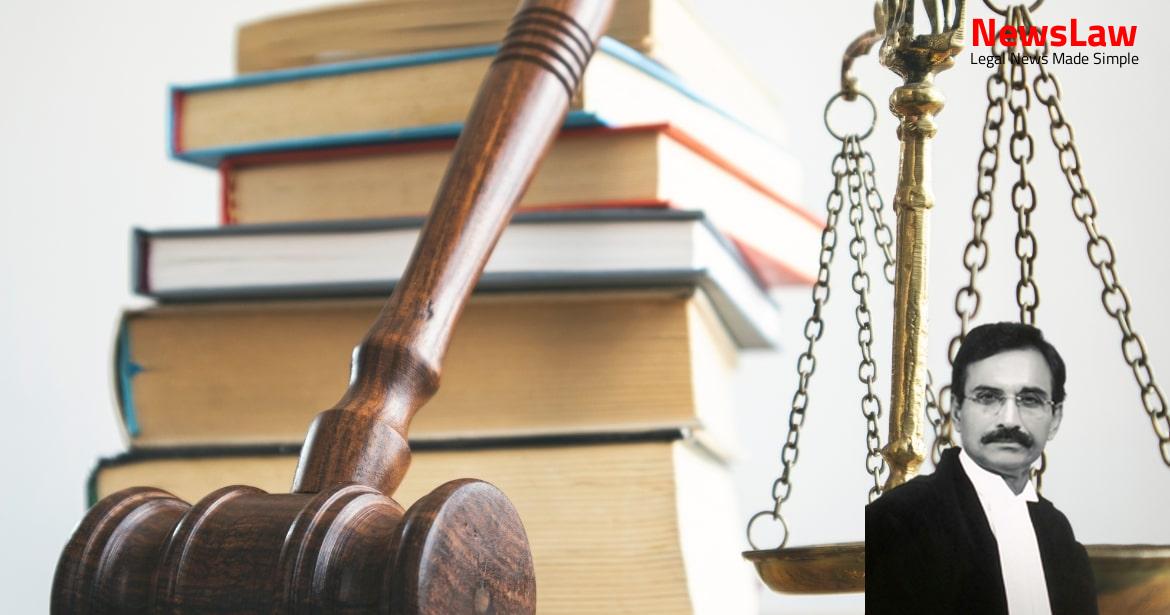Delving into the intricate legal analysis conducted by the court regarding the interpretation of the Registration Act, this case summary showcases the importance of understanding the provisions and procedures outlined in the Act. The court’s detailed analysis sheds light on the complexities involved in determining the validity of a registered document and the jurisdiction of Sub-Registrars. Stay tuned to unravel the legal insights presented in this intriguing case.
Facts
- The High Court dismissed a petition under Article 226 filed by the appellant seeking to quash an order dated 31 March 2012 of the District Registrar/Additional Collector (Finance and Revenue), Bareilly.
- Initially, the appellant claimed before the High Court that her signatures and thumb impressions/fingerprints were forged on the sale deed by the second respondent.
- The appellant’s story in the FIR stated that she willingly signed and placed her thumb impressions/fingerprints on the sale deed, which was later questioned by her granddaughter for an incorrect figure of the area mentioned.
- The High Court stated that the dispute concerning forged signatures should be resolved in a competent civil court as it involved a disputed question of fact.
- The Single Judge held that the Sub-Registrar does not have the authority to inquire into the validity of the title or legality of a transaction in a sale deed under the Registration Act, but only examines compliance with the Act’s provisions.
- The writ petition was filed after the FIR registration, and the sale deed had already been registered on 16 April 2012 complying with the District Registrar’s order of 31 March 2012.
- The execution and registration of the sale deed forms the basis of the dispute.
- The District Registrar set aside the Sub-Registrar’s decision and ordered the registration of the sale deed.
- The appellant had not lodged any fraud complaint during the one year and two month period between the agreement to sell and the sale deed presentation.
- The District Registrar concluded that the appellant admitted her signature on the document and the second respondent was entitled to registration.
- Statements made by the scribe and witnesses affirmed that the document was executed without pressure.
- An agreement to sell was registered in 2010, and payments were made towards the sale consideration.
- An FIR was filed by the appellant against the proprietors of the second respondent.
- The Naib Tahsildar concluded the registered sale deed was completely incorrect.
- The signatures and thumb impressions of the appellant were examined and found to be identical.
- The appellant raised objections to the sale deed registration, alleging fraudulent practices by the second respondent.
Also Read: Balancing Power and Transparency: Electoral Bonds Struck Down, Disclosure Mandated
Issue
- The present civil appeal revolves around two main issues
- First issue: Whether the second respondent can resort to Section 72 of the Registration Act after the Sub-Registrar refused registration based on the appellant’s denial of execution
- Second issue: Whether this recourse to Section 72 would deprive them of any remedy at all
Also Read: Recall of Resolution Plan Approval: Legal Analysis
Arguments
- The appellant admitted to the execution of the sale deed in her objections before the Sub-Registrar and in the FIR.
- The Sub-Registrar refused registration of the sale deed under Section 35(3)(a) due to denial of execution by the appellant.
- An appeal under Section 72 of the Registration Act can be made to the Registrar against the Sub-Registrar’s decision to refuse registration, except when the refusal is based on denial of execution.
Analysis
- The Registrar conducted an enquiry under Section 74 to determine if a document has been executed and if the legal requirements have been complied with.
- The power of the Registrar to summon witnesses and enforce attendance is granted under Section 75(4) for an enquiry under Section 74.
- The Sub-Registrar must refuse registration if the execution of a document is denied, as per Section 35(3)(a) of the Registration Act.
- An appeal under Section 72 does not lie when registration is refused on the grounds of denial of execution by the person purported to have executed the document.
- The Sub-Registrar’s order of refusal based on denial of execution was not appealable under Section 72.
- The appellant objected to the registration of a sale deed citing fraud and undue influence.
- The High Court may decline to entertain a writ petition if disputed questions of fact are involved.
- The High Court can use its writ jurisdiction under Article 226 to determine if the Registrar’s order for registration is contrary to statutory provisions.
- Section 74 provides the procedure for the Registrar to establish the execution of a document and compliance with legal requirements before registration can be ordered.
- The inquiry conducted by the Registrar under Section 74 is quasi-judicial in nature.
- The Registrar exceeded jurisdiction by deciding on issues of fraud and undue influence during registration proceedings.
- The registration of a document by the Sub-Registrar must be preceded by the presentation of the document by a proper person within the allowed time and admission of the execution of the document.
- Section 74 requires the Registrar to enquire whether the document has been executed and if the legal requirements have been complied with by the applicant or person presenting the document for registration.
- If the Registrar finds that the document has been executed and the legal requirements have been met, the Registrar shall order the document to be registered.
- Section 32 outlines who can present a document for registration, including the person executing the document or their representative or agent authorized by a power of attorney.
- Section 34 states that no document shall be registered unless the person executing it or their representative, assign, or authorized agent appears before the registering officer within the specified time limit.
- Section 35 details the conditions under which the registering officer shall register a document, including personal appearance of all persons executing the document and admission of execution.
- Sections 58, 59, and 60 outline the procedures for endorsement, dating, signing, and certifying a document once the requirements of registration have been fulfilled.
- Sections 71 and 72 deal with refusal of registration by the Sub-Registrar and appeals to the Registrar.
- Section 73 allows for an application to the Registrar in case of refusal on the ground of denial of execution, within thirty days, to establish rights for registration.
- Once a document is registered, it can only be cancelled or set aside by a civil court of competent jurisdiction.
- In a specific case, the Court emphasized that if a defendant does not dispute the validity of a lease in the written statement, they cannot later claim that the instrument is void for not being executed by both parties.
- The signing of an instrument is presumed to mean that both parties have executed it, but this presumption can be rebutted.
- Various High Courts have provided precedents on the meaning of ‘execution’ of a document.
- A deed of compromise signed by a party implies acceptance of valuable consideration, even if a dispute is later initiated.
- The interpretation of the phrase ‘execution’ involves understanding the contents of the document and not merely signing it.
- Registration Act aims to prevent fraud and forgeries by making document information public.
- Challenges to the validity of a registered document often lead to civil suits or writ petitions.
- Admitting one’s signature on a document does not automatically mean admitting to its execution.
- Different High Courts have provided interpretations on the execution of documents and the powers of Sub-Registrars/Registrars.
- The approach taken by the High Court is erroneous and cannot be upheld.
- The High Court’s finding that the sale deed was duly prepared by a scribe and attested by a witness does not equate to its execution by the appellant.
- Conflating the signing of the sale deed with its execution is a mistake made by the Single Judge of the High Court.
Decision
- The appeal is allowed and the impugned judgment and order of the Single Judge of the High Court of Judicature at Allahabad dated 31 May 2018 are set aside.
- The order passed by the District Registrar on 31 March 2012 is also set aside.
- Any pending application(s) are disposed of.
- The judgment shall not affect any civil or criminal proceedings related to the subject matter of the transaction.
Case Title: VEENA SINGH(DEAD) THROUGH LR Vs. THE DISTRICT REGISTRAR/ ADDITIONAL COLLECTOR (F/R) (2022 INSC 544)
Case Number: C.A. No.-002929-002929 / 2022



